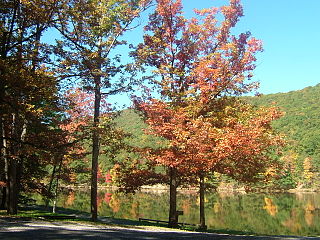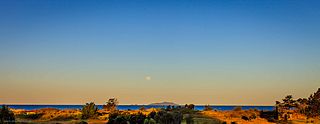
Millstream Chichester National Park is a national park in the Pilbara region of Western Australia, located 1,190 kilometres (739 mi) north of the state capital, Perth.

Bribie Island National Park is an Australian national park in the City of Moreton Bay, Queensland, 68 kilometres north of Brisbane. The park covers approximately one third of Bribie Island. The tidal wetlands and areas of water around the islands are protected within the Moreton Bay Marine Park.

Industrial waste is the waste produced by industrial activity which includes any material that is rendered useless during a manufacturing process such as that of factories, mills, and mining operations. Types of industrial waste include dirt and gravel, masonry and concrete, scrap metal, oil, solvents, chemicals, scrap lumber, even vegetable matter from restaurants. Industrial waste may be solid, semi-solid or liquid in form. It may be hazardous waste or non-hazardous waste. Industrial waste may pollute the nearby soil or adjacent water bodies, and can contaminate groundwater, lakes, streams, rivers or coastal waters. Industrial waste is often mixed into municipal waste, making accurate assessments difficult. An estimate for the US goes as high as 7.6 billion tons of industrial waste produced annually, as of 2017. Most countries have enacted legislation to deal with the problem of industrial waste, but strictness and compliance regimes vary. Enforcement is always an issue.

Camping is a form of outdoor recreation or outdoor education involving overnight stays with a basic temporary shelter such as a tent. Camping can also include a recreational vehicle, sheltered cabins, a permanent tent, a shelter such as a bivy or tarp, or no shelter at all. Typically, participants leave developed areas to spend time outdoors, in pursuit of activities providing them enjoyment or in a form of educational experience. Spending the night away from home distinguishes camping from day-tripping, picnicking, and other outdoor activities.

Campsite, campground, and camping pitch are all related terms regarding a place used for camping. The usage differs between British English and American English.

A caravan, travel trailer, camper, tourer or camper trailer is a trailer towed behind a road vehicle to provide a place to sleep which is more comfortable and protected than a tent. It provides the means for people to have their own home on a journey or a vacation, without relying on a motel or hotel, and enables them to stay in places where none is available. However, in some countries campers are restricted to designated sites for which fees are payable.

The freedom to roam, or everyone's right, every person's right or everyman's right, is the general public's right to access certain public or privately owned land, lakes, and rivers for recreation and exercise. The right is sometimes called the right of public access to the wilderness or the right to roam.

A campervan, also referred to as a camper, caravanette, motorhome or RV in North America, is a self-propelled vehicle that provides both transport and sleeping accommodation. The term describes vans that have been fitted out, whereas a motorhome is one with a coachbuilt body.

A portable or mobile toilet is any type of toilet that can be moved around, some by one person, some by mechanical equipment such as a truck and crane. Most types do not require any pre-existing services or infrastructure, such as sewerage, and are completely self-contained. The portable toilet is used in a variety of situations, for example in urban slums of developing countries, at festivals, for camping, on boats, on construction sites, and at film locations and large outdoor gatherings where there are no other facilities. Most portable toilets are unisex single units with privacy ensured by a simple lock on the door. Some portable toilets are small molded plastic or fiberglass portable rooms with a lockable door and a receptacle to catch the human excreta in a container.

A motorhome is a type of self-propelled recreational vehicle (RV) which is as the name suggests, like a home on wheels.

A recreational vehicle park or caravan park is a place where people with recreational vehicles can stay overnight, or longer, in allotted spaces known as "sites" or "campsites". They are also referred to as campgrounds, though a true campground also provides facilities for tent camping; many facilities calling themselves "RV parks" also offer tent camping or cabins with limited facilities.

The Maroon Bells are two peaks in the Elk Mountains, Maroon Peak and North Maroon Peak, separated by about half a kilometer. The mountains are on the border between Pitkin County and Gunnison County, Colorado, United States, about 19 kilometres (12 mi) southwest of Aspen. Both peaks are fourteeners. Maroon Peak, at 4,317 metres (14,163 ft), is the 27th highest peak in Colorado. North Maroon Peak, at 4,273 metres (14,019 ft), is the 50th highest. The view of the Maroon Bells to the southwest from the Maroon Creek valley is very heavily photographed. The peaks are located in the Maroon Bells–Snowmass Wilderness of White River National Forest. Maroon Bells-Snowmass Wilderness was one of five areas in Colorado designated as wilderness in the original Wilderness Act of 1964. The Wilderness area surrounds the extremely popular Maroon Bells Scenic Area, which is a major access point for Wilderness travel.

The Blue Flag is a certification by the Foundation for Environmental Education (FEE) that a beach, marina, or sustainable boating tourism operator meets its standards. The Blue Flag is a trademark owned by FEE, which is a not-for-profit non-governmental organisation consisting of 65 organisations in 77 member countries.

Promised Land State Park is a Pennsylvania state park in Blooming Grove, Greene and Palmyra Townships, Pike County, Pennsylvania, in the United States. The approximately 3,000-acre (1,214 ha) park is mostly surrounded by Delaware State Forest. It is in the Poconos and sits at an elevation of 1,800 feet (549 m). The second growth forests in Promised Land State Park are made up of beech, maple, oak and hemlock trees. There are two lakes within the boundaries of the park. Promised Land State Park is 10 miles (16 km) north of Canadensis on Pennsylvania Route 390.

Poe Valley State Park is a 620-acre (251 ha) Pennsylvania state park in Penn Township, Centre County, Pennsylvania in the United States. The park is surrounded by Bald Eagle State Forest. Poe Paddy State Park is 4 miles (6.4 km) to the east. The forests of the park surround the 25-acre (10 ha) Poe Lake. Poe Valley State Park is in isolated Poe Valley which lies between Potters Mills on U.S. Route 322 and Millheim on Pennsylvania Route 45. The park was closed during the 2008 and 2009 season while the lake was drained for dam repairs and the park facilities were upgraded.

The Freedom Camping Act is an Act of Parliament passed into law in New Zealand in 2011 that allows local authorities to pass bylaws that permit or prohibit freedom camping in specific areas. In 2011 the Minister for the Environment Nick Smith announced that the government will introduce a Freedom Camping Bill into Parliament with the intention that the law will be in place before the Rugby World Cup.
In 2011 the New Zealand Parliament passed the Freedom Camping Act, which gives local councils and authorities the power to ban freedom camping in some, but not all, areas. The New Zealand Parliament introduced the freedom camping act because some tourists disposed of human waste inappropriately where they were camping. The Act does not include Certified Self Containment even though attempts were made to include it. The reasoning is because the Standard is only applicable to a minority of Freedom campers as determined by the Act and that the NZStandard fails to comply with the bill of Rights Act.

Inskip is a coastal locality in the Gympie Region, Queensland, Australia. Inskip Point at the north of the locality is a vehicular gateway to Fraser Island. In the 2021 census, Inskip had a population of 22 people.

Uretiti Beach is a stretch of beach between Ruakākā and Waipu on Bream Bay to the south of Whangārei in Northland, New Zealand. It comprises the coastal side of the Uretiti Recreation Reserve and Uretiti Scenic Reserve, and is served by a Department of Conservation (DOC) campground within the Recreation Reserve. Uretiti Beach is popular for swimming, surfing, and fishing, a well-known clothing-optional beach, and camping area for the LGBTQ+ community over the New Year period.

The 2022 Wellington protest was an anti-mandate and anti-lockdown occupation of the grounds of Parliament House and Molesworth Street in Central Wellington during the peak of the COVID-19 pandemic. The occupation spring boarded off the New Zealand Convoy 2022, a mass convoy of vehicles that made its way from the top of the North Island and the bottom of the South Island to Parliament starting on Waitangi Day and arriving three days later on 9 February. The occupation lasted just over three weeks. At its peak, the protest spread over a large area of Thorndon and into Pipitea with approximately 1,000 participants. Protesters blockaded areas around the parliamentary grounds with their vehicles and occupied the lawn and surrounding areas in tents. Some associated with the protests harassed bystanders, and disrupted local businesses. The protest was forcibly ended by police on 2 March 2022, and the protesters had none of their demands met by the Government.






















